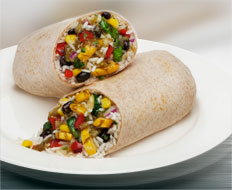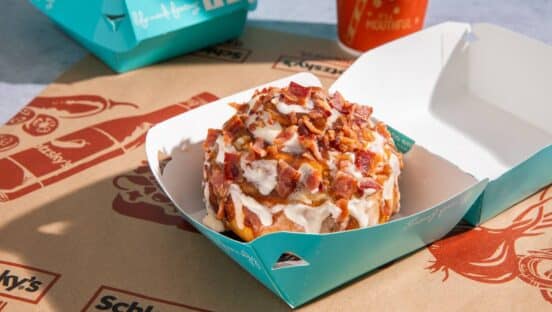On the heels of its “Naked” ordering option (menu items without a tortilla), expanded Kids Meal menu, and last year’s Craft 2 menu, Qdoba has raised its innovation bar higher this summer. The Denver-based Mexican chain recently announced that it is expanding its healthy options by testing whole-wheat tortillas in Seattle and Portland, Oregon, restaurants.
Fewer calories, less fat, and higher fiber than the chain’s traditional flour tortillas, the whole-wheat tortillas are available at no extra cost as an option for burritos or quesadillas.
With so much information touting the benefits of whole grains, including this year’s new USDA Dietary Guidelines for Americans, the addition of whole-wheat tortillas scores both health and nutrition points for the company.
This wider focus is right in line with what customers want, says Ted Stoner, Qdoba’s head chef and director of strategic product development.
“The way people think about health has changed,” he says. People are looking for “beneficial ingredients rather than less calories,” so Qdoba provides both and leaves the choice up to guests. The whole-wheat tortillas speak to guests’ concerns with fat, saturated fat, sodium, fiber, and whole grains, Stoner says.
Though Qdoba works hard to offer healthy options when possible, guests had the most sway in bringing the whole-wheat tortillas to the menu. “Our guests have been asking for years,” Stoner says, “and we always pay attention to what our guests want.”
The idea had actually been in play for a while, Stoner says, but it was a challenge to find a product that was healthy in one way, such as low fat, and not blown out of proportion in another, like high sodium. Once the health quotient was met, he says, it needed the flexibility to accommodate a big burrito and, of course, taste great.
Innovative Mexican flavors have been the cornerstone behind Qdoba’s food, though the restaurant’s image is built around its healthy platform, Stoner says. He says he enjoys shattering the stereotype that Mexican food is unhealthy by presenting flavors that stand out independently of their healthy profile.
“We choose to be stealthy healthy more often than not,” Stoner says. The concept has been doing it for years with the Picante Ranch Dressing and the vegetarian black and pinto beans, which are fat free. It’s what Stoner calls the “benefit of great flavor.”
So far, Stoner says, customers’ reception of the whole-wheat tortillas has been great. Some weeks, he says, the whole-wheat option has accounted for 50 percent of sales with tortillas.
Lori A. Walderich, chain restaurant consultant of Idea Studio in Tulsa, Oklahoma, says the key to what Qdoba is doing is offering customers a choice of a healthier option. She stresses the importance of giving people choice, “because there’s more power to craft their own healthy diets. Some people are concerned with salt, fat, or high fiber. With so many health needs, you can’t really stick to one.”
Before testing or rolling out a new menu item, Walderich says, both core and potential customers must be taken into consideration.
“Be in touch with your customer, that’s what the research is all about,” she says. “If there’s enough people asking and it makes sense,” it’s good to do.
Still, Walderich says, quick serves must be sure not to alienate those core customers with something that might just be a trend. “Give them options,” she says.
Another new way Qdoba is giving its customers options is by making jars of its popular Salsa Verde and Salsa Roja available for retail purchase at participating Denver Metro and Colorado Springs locations.
Salsa Verde, a medium-heat salsa made with tomatillos, and Salsa Roja, a spicier blend made with fire-roasted tomatoes, are sold in 16-ounce jars for $4.99 each. Like the whole-wheat tortillas, selling the salsas is the result of guests often asking if they can purchase them, Stoner says.
“We’re looking to expand the salsa,” he says. “It’s good for brand marketing and exposure.”
But Qdoba is entering this new venture carefully; Stoner says the brand doesn’t want a licensed product right away. “We want more control,” he says. “We’re putting our toe in the water.”
Walderich says it’s smart to “tiptoe” into licensing a product because it can be a costly venture. But if the customer demands it and the company has done a feasibility study, she says, it can make perfect sense.
“If they’re known for the salsa, I see no risk in testing this,” she says. “It becomes another revenue stream that [puts] their brand in front of the customers.”
Qdoba’s healthy image may be an advantage on supermarket shelves, as well, Walderich says.
“I think there’s an advantage for it to be there as long as they position it to be consistent with the restaurant’s image,” she says.





